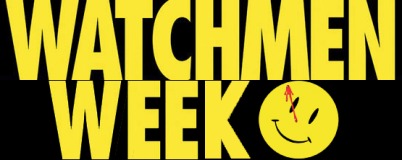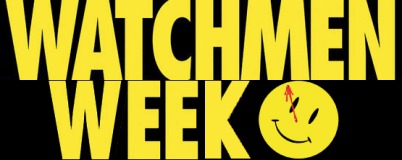|
"Who are we saving them from?" asks NiteOwl in a moment of concern. * * * When viewing Watchmen in the Theater, I was struck by how dark their world truly was. One film critic remarked that it was the darkest, most serious superhero film ever made- one without "comic" appeal. There wasn't even a moment of jest or comic relief to break up the brooding tension. It was serious, slow, and violent. * * * My own personal opinion is that this film is a great picture of what happens when men abandon God and set themselves up in His place. It becomes a terrible place where violence begets violence and the only way to find peace it through fear. Adrien knows this, and that's why he enacts his master stroke- blowing up the world to save the world. * * * A few questions to wrap up WATCHMEN WEEK: * * * * Those who avoid reading Nietzsche because he's associated with the phrase "God is Dead" miss out on a lot of his great contributions to Philosophy. It's true that he was an Atheist- but if we consider his teachings without condemning his beliefs, he's actually got a lot of interesting things to say about what life is like when people reject the idea of God. This is going to be a very short post today because my parents are on their way over to help us celebrate ONE YEAR with our little boy Ethan. Hopefully, tomorrow I'll be able to finish a post I've been working through in Nietzsche's superman and the dark nature of the Watchmen World. Until then, here's some brief thoughts on fear... * * * At the end of the film version (the ending is different than the book, in case you didn't know this), Lori wonders if peace will truly last. Dan answers by muttering a line that's stuck with me this past week: "As long as people think Jon's watching us, we'll be alright..." * * * Or to put it another way: "as long as people are scared of some mutual enemy- we'll be alright." * * * Pluggedin-Online made the assumption that this was a subtle reference to God- the Old Testament version that many see as vindictive and fearful. Does Jon represent "god" for a lot of people? An omniscient being that dishes out punishment whenever we cross Him? "Evil, Evil Adrien Veidt.He's like Hitler, only a little less mustached." * * * Historical Fiction: President Truman and the War Room * * * OK, this isn't exactly the same conversation that Adrien Veidt has with the other Watchmen as he reveals his plan to blow up New York City (and a number of other cities, too, in the film)- but the logic is close enough to serve our purposes. * * * What do you think? This week, I'm going to delve into the movie Watchmen. If you haven't seen the movie or read the comic then you'll probably want to avoid my blog for a few days- especially since I'm not going to do the *Spoiler Alert* thing- save this disclaimer. We're dealing with source material that's a quarter century old. It's open game as far as I'm concerned... * * * I had a friend walk out of the movie Watchmen during the scene where The Comedian attempts to rape the Silk Spectre. Another friend of mine sent me a text message moments before I went to see the film, warning me that the movie was one long depiction of violence against women (based on that scene and a few others where women are hurt, killed, or beaten). * * * This morning, I read a stunning article by Mary Mackey about women, violence, and film. You can read it here. * * * I wonder if that's how my friend felt when she saw the violence perpetuated against women in the film Watchmen? * * * Hopefully you took the time to read Mary Mackey's article. After digesting her assessment of violence against women and the (unintentionally) meaningless violence against women in Watchmen: |
About NathanNathan Key likes to think about faith and philosophy and talk about it with others. He lives with his family in New Hampshire. He doesn't always refer to himself in the third person. |




